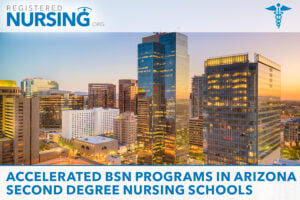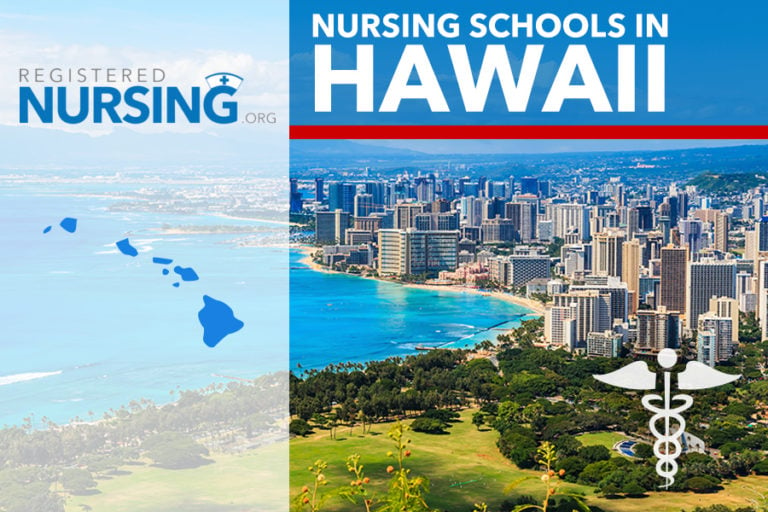Hawaii is not only the ideal destination for honeymooners and vacationers. It’s also one of the best states you could ever choose to start a new career as a nurse. Over the course of the next ten years, the number of nursing positions is expected to increase by 9%. If you’re looking for nursing programs in Hawaii, you’ll also find plenty of options whether they’re on campus or online. Learn about these options in the section below.
2025 Best Nursing Schools in Hawaii
Finding the best nursing school in Hawaii is easier when you look at NCLEX-RN pass rates, and that's exactly what registerednursing.org has done. Their rankings highlight schools where students excel, giving future nurses a clear path to success. The NCLEX-RN pass rate is a key factor in these rankings because it shows how well a school prepares its students for the real challenges of nursing. Choosing a school with high pass rates means you're more likely to pass the exam and start your career strong. It's a smart move for anyone serious about nursing. For more details on how these rankings were put together, check out https://www.registerednursing.org/rankings-methodology/.
Chaminade University of Honolulu
Honolulu, HI - Private 4-year - chaminade.edu
Bachelor's - Bachelor of Science in Nursing
Campus Based - Visit Website
Chaminade University of Honolulu's Bachelor of Science in Nursing (BSN) program stands out for its commitment to preparing students for the evolving healthcare landscape through a blend of hands-on clinical experience and evidence-based practice. This four-year, campus-based program is rooted in a values-based approach, fostering leadership and communication skills essential for nursing professionals. Admission is competitive, requiring a strong GPA and completion of prerequisite courses, though it does not mandate ACT or SAT scores. Notably, the program boasts accreditation by the CCNE, ensuring high educational standards. Graduates are well-prepared to excel in the NCLEX-RN, contributing to the program's reputation for producing skilled, compassionate nurses.
- Four-year full-time program.
- Emphasizes hands-on learning.
- Requires health compliance.
- Values-based approach.
- Strong community partnerships.
- Individualized mentoring.
- Clinical courses included.
- Competitive GPA required.
- Prerequisite courses needed.
- Leadership skills development.
Hawai'i Pacific University
Honolulu, HI - Private 4-year - hpu.edu
Bachelor's - Bachelor of Science in Nursing
Campus Based - Visit Website
Hawaii Pacific University's Bachelor of Science in Nursing (BSN) program stands out for its multicultural learning environment and comprehensive curriculum, designed to prepare students for the NCLEX-RN and a successful nursing career. Located in Honolulu, HI, the program emphasizes patient-centered care, teamwork, and evidence-based practice through hands-on clinical experiences across O'ahu. Prospective students must complete prerequisite courses such as Anatomy and Physiology and Microbiology. While the program does not specify a concentration, it offers a broad foundation in nursing, supported by a commitment to professional development. Hawaii Pacific University is military-friendly, making it a great choice for veterans pursuing nursing. The program's NCLEX-RN pass rates reflect its effectiveness in preparing graduates for the challenges of modern healthcare.
- Campus-based program
- Multicultural learning environment
- Hands-on clinical experiences
- Focus on patient-centered care
- Teamwork and collaboration emphasis
- Evidence-based practice curriculum
- Prerequisite courses required
- Located in Honolulu, HI
- Prepares for healthcare careers
- Supports professional development
Hawaii Nursing RN Programs – Diploma, ADN, and BSN Degrees
To begin your new career, you’ll need a degree to get licensed. Entry-level nursing degrees include an Associate's Degree in Nursing (ADN), a nursing diploma, or a Bachelor of Science in Nursing (BSN). To learn about the differences and how they may apply to you, read below.
Comparing RN Diploma vs. LPN-to-RN vs. ADN Programs
If you’re looking for the quickest route to licensure, you’ll want to go with either an ADN or a nursing diploma. These degree programs are designed to supply you with the minimum training required to get licensed and usually can be completed in only a year or two. If you’re already working as an LPN, you may be able to enroll in an LPN to RN bridge program which can lead to either an ADN or a BSN in a shorter amount of time than if you eroll in a traditional ADN or BSN program.
Common admissions requirements for ADN and diploma programs in Hawaii include:
- High School Diploma or GED
- Minimum GPA, typically 2.5 or higher
- Some programs require scores from the TEAS (Test of Essential Academic Skills) or HESI Admission Assessment
For further admissions requirements and more information, check out our page on ADN degree programs.
More information on RN diplomas, LPN to RN, and ADN programs:
| Program | Estimated Tuition | Estimated Credits | Online Availability |
|---|---|---|---|
| ADN | $6,000 – $15,000 | 60-72 credits | Limited online courses, primarily on-campus |
| LPN to RN | $4,000 – $10,000 | 30-45 credits | Often hybrid; some online courses |
| RN Diploma | $5,000 – $12,000 | 40-60 credits | Rarely online; primarily on-campus |
ADN, LPN to RN, and nursing diploma programs require hands-on clinical training hours under supervision in order to be eligible for RN licensure. These will need to be completed in person, even if you opt for an online or hybrid program. Not sure if you’re ready for an RN career? Consider an LPN or CNA program in Hawaii.
Comparing Traditional BSN vs. RN-to-BSN vs. ABSN Programs
ADN degree programs and nursing diploma programs are great options for students looking to get into the field as fast as possible, but if you’re hoping to get a little more training before diving into a new career, a Bachelor of Science in Nursing (BSN) program is likely the better option. BSNs can also help you secure job opportunities faster as this degree is usually the more attractive option to employers (compared to ADNs and nursing diplomas). A traditional BSN takes four years to complete, but if you are already licensed as an RN, you can take advantage of RN to BSN programs. Accelerated BSN programs may also be a viable option if you have a bachelor’s degree already.
Admissions requirements for BSN programs in Hawaii typically include:
- High School Diploma or GED
- Minimum GPA of 2.5-3.0
- Completion of prerequisite courses
For more information on BSN admissions requirements and more, see our BSN degrees page.
Several alternative pathways are also available to qualified students who want to pursue a BSN. Compare your options below:
| Program | Length | Estimated Tuition | Entrance Level |
|---|---|---|---|
| Traditional BSN | 4 years (120-126 credits) | $20,000 – $50,000 | First-time college students |
| RN to BSN | 1-2 years (30-35 credits) | $10,000 – $20,000 | Licensed RNs with an ADN |
| ABSN | 12-18 months (50-60 credits) | $25,000 – $40,000 | Non-nursing bachelor’s degree holders |
RN to BSN
For RN bridge programs visit:
Working nurses who want to go back to school to get their BSN degree have an easy path to do so through a Hawaii RN to BSN program. These programs are open to students with an RN license, an ADN, an at least a year of nursing experience. From start to finish, most nurses can complete an RN to BSN program in as little as 2 years.
Accelerated BSN (ABSN)
If you have a bachelor’s degree already (even if it’s in a subject other than nursing) you can switch your major and get your BSN in only a year or two through a Hawaii ABSN program. This is a great option for students looking for a career change later in life.
Advanced Practice RN & Nurse Practitioner Programs
Lastly, if you’re hoping to eventually practice independently as a nurse practitioner or advanced practice nurse, you’ll need to graduate from either a Master's of Science in Nursing (MSN), a Nurse Practitioner (NP) program, or a doctorate degree such as a Doctor of Nursing Practice (DNP). These programs range between 2 and 6 years following a bachelor’s degree program.
Earning a graduate-level degree in nursing opens the door to numerous Advanced Practice Registered Nursing (APRN) roles, leadership roles, and even careers in academia or research. Read more about APRN pathways in Hawaii:
- Hawaii Nurse Practitioner Programs
- Hawaii MSN Program
- Hawaii Accelerated MSN Program
- Hawaii RN to MSN Programs
- Hawaii Post Master’s Nursing Certificate Programs
- Hawaii DNP Programs
Getting an RN License in Hawaii
The final step in the process is getting licensed. To get licensed as an RN, you’ll need to pass the NCLEX-RN exam and send a completed application to the Hawaii Board of Nursing and pay the required fee. Once the board has processed your application, you should receive your license within the coming weeks or months. Remember, you’ll need to maintain licensure through continuing education courses.
Requirements for RN Licensure in Hawaii
- Completion of an accredited RN program (ADN or BSN)
- Passing the NCLEX-RN exam
- Application to the Hawaii Board of Nursing
- Renewal: 36 hours of CE every three years for license maintenance
Why Choose an Accredited RN Program?
Before you begin applying to nursing programs, it’s important that you double-check each one to make sure that it meets the proper requirements for RN program accreditation. Accreditation for nursing programs in the US is supplied by the Accreditation Commission for Education in Nursing (ACEN) and the Commission on Collegiate Nursing Education (CCNE). If your program is not accredited by one of these two organizations, you will not meet the board’s requirements for licensure.
Cities With Nursing Programs in Hawaii
List of Nursing Schools in Hawaii
Hawaii offers a range of nursing schools for those looking to start or advance their careers in healthcare. These schools provide various programs, from practical nursing to advanced degrees, across different cities in the state. Below, you'll find a table listing these schools, their locations, program highlights, and links to more information. Whether you're just starting out or seeking further education, Hawaii's nursing schools have options to meet your needs.
Hilo, HI
Hawaii Community College
- Associate - Associate in Science Degree in Nursing
Campus Based - Website
- Prepares for NCLEX-RN exam.
- Approved by Hawai'i State Board.
- ACEN accredited program.
- LPN-to-ASN pathway available.
- Financial aid options.
- Disability services provided.
- Covers general education.
- Includes nursing courses.
University of Hawaii at Hilo
- Bachelor's - Bachelor of Science in Nursing
Campus Based - Website
- Culturally focused nursing care.
- Hands-on learning opportunities.
- Competitive admission process.
- Rural clinical experiences.
- State-of-the-art simulation labs.
- Limited cohort sizes.
- Emphasis on transcultural nursing.
- Community health projects.
Honolulu, HI
Chaminade University of Honolulu
- Bachelor's - Bachelor of Science in Nursing
Campus Based - Website
- Four-year full-time program.
- Emphasizes hands-on learning.
- Requires health compliance.
- Values-based approach.
- Strong community partnerships.
- Individualized mentoring.
- Clinical courses included.
- Competitive GPA required.
Hawai'i Pacific University
- Bachelor's - Bachelor of Science in Nursing
Campus Based - Website
- Campus-based program
- Multicultural learning environment
- Hands-on clinical experiences
- Focus on patient-centered care
- Teamwork and collaboration emphasis
- Evidence-based practice curriculum
- Prerequisite courses required
- Located in Honolulu, HI
Kapiolani Community College
- Associate - Associate in Science Degree in Nursing
Campus Based - Website
- Prepares for NCLEX-RN exam.
- Blends theory and clinical practice.
- Eligible for BSN programs at UH.
- Requires 'C' or higher in prerequisites.
- 2.5 GPA requirement for admission.
- ATI TEAS exam required.
- Focus on safety and ethics.
- Evidence-based practice emphasis.
University of Hawaii at Manoa
- Bachelor's - Bachelor of Science in Nursing
Campus Based - Website
- Cohort program completed in 3 years.
- Prepares for NCLEX-RN licensure.
- Holistic admission review process.
- Preference to Hawaii residents.
- Hands-on clinical experience.
- Courses in health promotion.
- Pathophysiology included.
- Professional nursing practices taught.
- Bachelor's - High School Direct Entry in Nursing
Campus Based - Website
- Four-year full-time program.
- Direct entry for high school graduates.
- Prepares for NCLEX-RN exam.
- Fall admission only.
- Focus on professional nursing values.
- Emphasizes evidence-based care.
- Leadership in nursing included.
- Campus-based program.
- Bachelor's - UH West Oahu Pre-Nursing to UH Manoa Bachelor of Science in Nursing
Campus Based - Website
- Competitive admission process.
- Prepares for NCLEX-RN exam.
- Minimum GPA requirement 3.0.
- Comprehensive nursing curriculum.
- Individual academic advising.
- Focus on health promotion.
- Illness management training.
- Professional development included.
Kahului, HI
University of Hawaii Maui College
- Associate - Associate in Science Nursing (ASN)
Campus Based - Website
- Campus-based program
- Offers PN and RN pathways
- Focus on patient-centered care
- Hands-on clinical experience
- Emphasizes cultural awareness
- Evidence-based practice
- Professional ethics training
- Financial aid available
Lihue, HI
Kauai Community College
- Associate - Nursing: Associate in Science Degree (Registered Nursing)
Campus Based - Website
- ACEN accredited program.
- Prepares for NCLEX-RN exam.
- Minimum GPA 2.75 required.
- TEAS exam proficiency needed.
- Two-year curriculum includes summers.
- Hands-on clinical experience.
- Transfer options to UH Manoa.
- Focus on evidence-based practice.
Latest Articles & Guides
One of the keys to success as a registered nurse is embracing lifelong learning. Our articles and guides address hot topics and current events in nursing, from education to career mobility and beyond. No matter where you are on your nursing journey, there’s an article to help you build your knowledge base.
Browse our latest articles, curated specifically for modern nurses.




